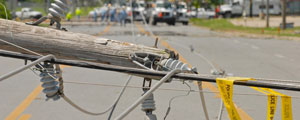
The number of accidents involving electricity reported to the National Social Security Authority is increasing.
Talking Social Security with NSSA
On average, one electrocution (death due to electrical energy) is reported every month.
Electrical safety is an important matter controlled by the Factories and Works (Electrical) Regulations, RGN No. 304 of 1976, copies of which all employers who use electrical power in one form or another should have available for their personnel to read.
Most electrical accidents could have been avoided if various electrical hazards had been recognised and action taken to deal with them.
Electrical accidents are caused either by defective equipment, unsafe work practices or ignorance of the dangers of electricity. Most can be attributed to human error, such as negligence or carelessness, forgetfulness, experimenting, taking short cuts or ignorance.
Types of equipment frequently involved in electrical accidents include distribution networks, motor-driven equipment, control devices, portable electric tools, and switches and panels.
Common tool and equipment defects include incorrectly grounded equipment. Sometimes the earth wires are missing, broken or incorrectly connected.
- Chamisa under fire over US$120K donation
- Mavhunga puts DeMbare into Chibuku quarterfinals
- Pension funds bet on Cabora Bassa oilfields
- Councils defy govt fire tender directive
Keep Reading
Open conduits, switch boxes, damaged or worn connections and exposed live wires are another hazard that comes under the heading of equipment defects. Unguarded live parts are common, particularly in areas with “No unauthorised persons” caution notices. Wiring defects are also a major cause of residential and workplace fires.
Equipment not made or installed according to suitable standards constitutes another defective equipment hazard.
Insulation which is defective, inadequate or compromised may create short circuit possibilities and energise equipment frames. Defective switches, receptacles, extension cords and lamp sockets are potentially hazardous, as are dirty motor windings, improperly adjusted brushes and worn out commutators.
Improperly connected power tools are yet another hazard. Other equipment hazards include broken housings and loose or vibrating machine parts which might come into contact with and energise tool or machine frames and expose the operator to “live” surfaces.
Unsafe practices and work procedures often result in electrical accidents and fires. Such unsafe practices include using ungrounded or incorrectly earthed equipment and portable tools. Double insulated tools should be safe, though.
Failure to de-energise, or in other words switch off or disconnect, electrical equipment when it is being repaired or inspected is a common unsafe practice. Many companies do not have an isolation switch or lock-out procedure that would enable equipment in need of repair to be isolated from the mains.
Another risky practice is the intentional use of obviously defective and unsafe tools or equipment in need of repair.
Overloading of circuits or over-fusing circuits by using the wrong size or type of fuse is another common man-made electrical hazard. Fuses are designed to blow in the event of a short-circuit.
Replacing fuses with wire or aluminium foil from a cigarette packet defeats the objective of having a fuse. Not only is it dangerous it may result in expensive damage to equipment.
Some people repeatedly close off switches or circuit breakers when there is a fault. Tying or holding in place switches that keep tripping is a common practice. That may stop the switch tripping but it does not remedy the fault that is causing the switch to trip. It is therefore dangerous and may lead to fire breaking out and equipment being damaged.
Failure to use the right class of equipment for a hazardous location is another dangerous mistake.
Failure to subject installations to periodic inspection and testing by a competent person can prove costly in the long run. All electrical installations deteriorate with age and use.
Incorrect procedures during maintenance and checking for failures may either create a hazard or result in failure to detect one.
The same is true of unauthorised installation or modifications of electrical facilities.
More often than not operating, maintenance and record keeping procedures and instructions are not updated.
It might be difficult to imagine anyone cleaning electrical equipment with water or dangerous solvents, but it has happened. Failure to maintain adequate safety clearance where electricity cables are installed can be fatal.
Failure to notice electric lines can be a deadly mistake. Contact is not required to initiate an arc or cause shock and burns. The use of metal ladders while working on electrical equipment is hazardous. Failure to adequately identify equipment and controls may also lead to accidents.
Devices are now readily available that can guarantee safety against electrocution or serious shock from defective equipment.
Handling of equipment by untrained or unskilled personnel should be avoided. It is dangerous for a person who cannot operate equipment to attempt to maintain or repair it. Saving money by utilising the services of a cheap electrician with dubious credentials could prove costly in the long run.
Electricity is an invaluable source of power for all businesses and all households especially urban dwellings. However, electricity can be dangerous. It is important to be aware of this and take all necessary precautions when utilising and dealing with it.
Talking Social Security is published weekly by the National Social Security Authority as a public service.
There is also a weekly radio programme, PaMhepo neNssa/Emoyeni le NSSA, discussing social security issues at 6:50 pm every Thursday on Radio Zimbabwe and 6.50pm every Friday on National FM. Readers can e-mail issues they would like dealt with in this column to [email protected] or text them to 0735 041 278. Those with individual queries should contact their local NSSA office or telephone NSSA on (04) 706517-8 or 706523 5.











